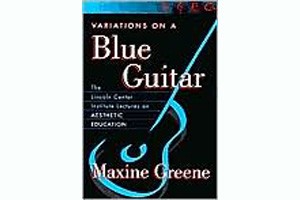
August 27, 2014
aesthetic space, aesthetic experience

An excerpt from Greene's Variations on a Blue Guitar (p.53) that discusses situating oneself inaesthetic space
and discusses how works of art are privileged objects:
Perhaps this may ignite interesting conversations.
To talk about aesthetic experience and aesthetic education, of course, is to presume that there exist certain objects and events that give rise to the distinctive experiences I have been trying to describe. Now it is indeed the case that you can have an aesthetic experience in the natural world, even on the streets of this city...There are the angular shadows of the buildings, the hazy look of the towers downtown, the sometimes gray-blue light over the river, the green of leaves against stone, the occasional flash of the sun on a windowpane, the colors of the fruit on the Broadway fruit stands, the sound of a street violinist, the turn of a lithe body on a skateboard, the sun on a child's yellow hair. Now you know very well that, if you are primarily concerned with getting [somewhere] on time, keeping your eyes on the traffic, peering to see if the bus is coming, you are not going to pay heed to shadows or gray-blue light tones or the colors of apples and cherries and pears. The boy on the skateboard will be nothing but an obstacle. The yellow-haired child will be part of the crowd. It takes a kind of distancing, an uncoupling from your practical interests, your impinging concerns, to see what we sometimes describe as the qualities of things, to make out contours, shapes, angles, even to hear sound as sound. If you can uncouple in this fashion, if you are still for a moment, if you take the kind of stance that allows the river or the towers or the fruit stand to appear in what might be called an aesthetic space - one you would be bringing into being by your paying heed - you can indeed have an aesthetic experience with the world around...
What I think we ought to understand is that paintings, dances, musical works, poems, and the rest are deliberately made for the sake of such experience. They are sometimes called privileged objects for that reason. But if they are to come into existence for you as aesthetic objects or events, they also have to be attended to in a particular way. They do not open themselves automatically, any more than do apples and cherries on a fruit stand; they have to be achieved as aesthetic objects, and that has everything to do with you...
My point is that, if the painting or the dance performance or the play is to exist as an aesthetic object or event for you, it has to be attended to in a particular way. You have to be fully present to it - to focus your attention on it and, again, to allow it to exist apart from your everydayness and your practical concerns. I do not mean that you, as a living person with your own biography, your own history, have to absent yourself. No, you have to be there in your personhood, encountering the work much in the way you encounter other persons. The proper way to encounter another person is to be open to them, to be ready to see new dimensions, new facets of the other, to recognize the possibility of some fresh perception or understanding, so you may know the other better, appreciate that person more variously. This is, actually, how we ordinarily treat each other as persons. We do not treat each other as case histories, or instances of some psychological or sociological reality - not, that is, in personal encounters. Nor do we come up against each other as if the other were merely an inanimate object, incapable of reciprocation. There are analogues between this and encounters with works of art, especially in the readiness for fresh illumination, in the willingness to see something, to risk something unexpected and new.



